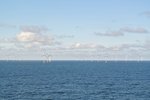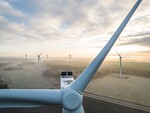News Release from windfair.net
Wind Industry Profile of
Dawning East - More and More Countries Switch to Renewable Energies
During these last months, the question came up more frequently whether the often so highly praised US, for many people the epitome of the advanced 'West', still deserve this designation, because the unspoken promise of freedom, open-mindedness and future viability seems to be at stake under Mr. Trump.
The world is changing
Taking a look at the world at the moment, a lot seems to be on the move. The Chinese are suddenly at the forefront of investing in renewable energies, and are lecturing the US about climate change. Now another high-tech country follows the step that Germany has already taken: South Korea's new president has announced the exit of nuclear power and coal.
President Moon Jae-in (pictured below) announced this major shift towards renewables in a speech on Monday. The occasion could not have been more appropriate: the country's oldest nuclear power plant, Kori-1, has been shut down after 40 years. At the same time, he promised to scrap all new nuclear facilities, as well as plans for more coal power plants. There will be public consultations on the fate of the two Shin Kori 5 and 6 reactors which are currently under construction.
No more support of the people
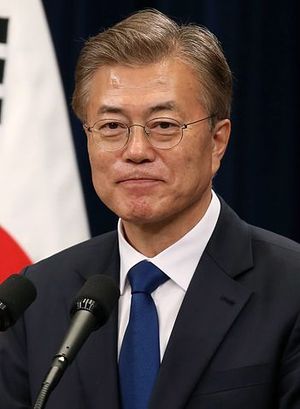 Various environmental organizations like Greenpeace welcomed this step immediately. “People in South Korea have been demanding an energy transition for a long time in major cities and this is one reason why President Moon’s electoral pledge for a safe and clean energy policy was so popular during the presidential campaign,” said Daul Jang, Senior Climate & Energy Campaigner at Greenpeace East Asia.
Various environmental organizations like Greenpeace welcomed this step immediately. “People in South Korea have been demanding an energy transition for a long time in major cities and this is one reason why President Moon’s electoral pledge for a safe and clean energy policy was so popular during the presidential campaign,” said Daul Jang, Senior Climate & Energy Campaigner at Greenpeace East Asia.
Many factors have made the population in South Korea increasingly sceptical towards nuclear energy. Fukushima's maximum credible accident and a strong earthquake last year in their own country contributed to this as well as serious problems with fine dust, which makes life in the big cities increasingly difficult. South Korea last year was still the fifth-largest producer of nuclear power worldwide. About one third of their electricity mix is still supplied by the country's 25 nuclear power plants. Instead, however, it is now planned to invest extensively in solar and offshore wind energy.
Trump vs. the rest of the world
Moon also emphasized that South Korea will stick to the set goals within the framework of the Paris Climate Agreement: the country wants to achieve 37% less CO2 emissions by 2030. This objective was still heavily criticized at the time of the conclusion of the agreement as it is lower than previous targets. South Korea is among the countries where emissions are rising most rapidly. If the now-planned structural change is actually pushed through at the pace the President suggests, their goals are likely to become more ambitious.
There are also news from Russia. Thus, after the American withdrawal, President Putin hastened to emphasize that his country would stick to the Paris resolutions. Now first actions follow. The idle wind power market was brought back to life and first tenders for a total of 700 megawatts were awarded for construction within the next three years.
Western knowledge for Russia
This week, Dutch wind turbine manufacturer Lagerwey announced a collaboration with OTEK, a subsidiary of Rosatom. Rosatom is Rissia's federal Atomic Agency which heads the country's civilian and military nuclear industry and, according to estimates by experts from the European Parliament controls 98 percent of Russia's nuclear material. OTEK, on the other hand, is the non-nuclear subsidiary of the agency, which will enter into a joint venture with the Dutch by the end of the year. Together they will control a factory in Russia, which is supposed to produce turbines with a capacity of 250 MW per year. First of all, workers must be trained on the ground, since there is no previous knowledge.
So far the biggest problem in Russia is the lack of political support for the expansion of renewable energies. The country's wind power potential is huge, but so far only a few companies have dared to invest. Corruption and opaque business practices have a deterrent effect, as a new study by WWEA shows. A system of subsidies for renewable energy is missing and the expansion of the electricity grid is likely to be a major problem. But solar and wind offer the possibility to supply energy even to remote areas.
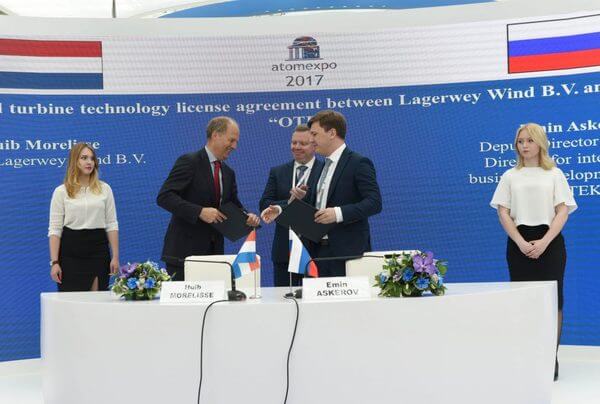
Turbines from Lagerwey are set to boost the Russian wind market (Picture: Lagerwey)
The big brother as an example?
If Russia actually invests in renewable energies in the coming years, a strong effect on the entire Asian region can be assumed. Even in countries like Kazakhstan a great potential for renewable energies is still untapped. But so far, like their 'big brother Russia', they focused entirely on oil and natural gas. However, falling prices on the world market on the one hand and increasing environmental problems on the other could lead to a change of thinking. Kazakhstan is struggling with major problems in water supply, as the promotion of nuclear and fossil raw materials wastes and pollutes large water resources, as German environmental politician Hans-Josef Fell has stated numerous times in public. Major faults in water management have led to the drying out of Lake Aral, e.g.
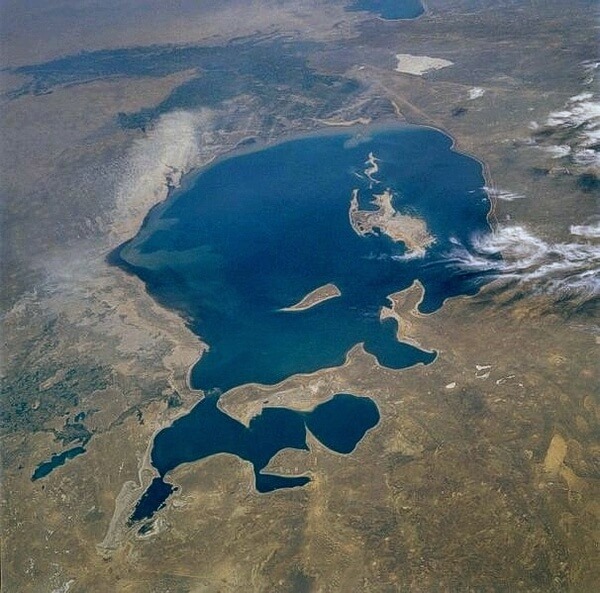
The Aral Lake in 1985 (picture: NASA) was once the fourth largest lake in the world. Meanwhile, large parts are dried out.
There is still a long way to go before most Asian countries have masted their energy transition. But who knows what else Trump's politics will lead to?
- Author:
- Katrin Radtke
- Email:
- press@windfair.net
- Keywords:
- Russia, South Korea, Kazakhstan, Paris Climate Agreement


